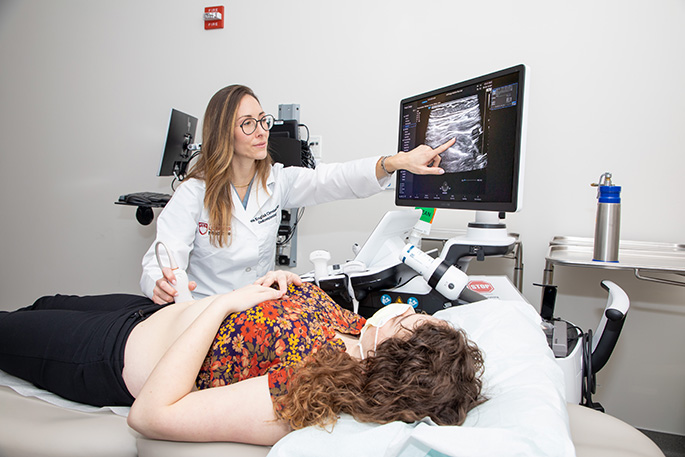Intestinal Ultrasound for Inflammatory Bowel Disease (IBD)
If you have Crohn’s disease or ulcerative colitis, you know how frustrating it is when your symptoms flare up despite your best efforts. However, a novel noninvasive technology called intestinal ultrasound can help you better understand what’s triggering your symptoms by allowing you and your doctor to see what is happening inside your intestines in real time during a clinic visit.
What is Intestinal Ultrasound?
Intestinal ultrasound offers highly accurate images of your bowel — without any special preparation required — so you and your doctor can understand the cause of your symptoms and make immediate changes to your treatment if needed.
Considered the future of IBD monitoring, intestinal ultrasound is already a regular part of practice in other areas of the world including Europe, Australia, Canada and Japan. The University of Chicago Medicine Inflammatory Bowel Disease Center is one of only a few centers in the country — and the only one in the Midwest — to offer this safe and convenient tool for patients with inflammatory bowel disease.
How Can Intestinal Ultrasound Help Patients with Inflammatory Bowel Disease?
Intestinal ultrasound performed by a trained IBD provider can transform care and disease management for patients of all ages who have IBD.
When you come to UChicago Medicine, you may have an intestinal ultrasound as part of your physical exam during your initial and follow-up visits. It can be used to:
- Monitor your disease activity: Intestinal ultrasound can track how active your IBD is and check for complications like bowel strictures, fistulas or abscesses.
- Assess your response to medication: With intestinal ultrasound, you can receive immediate feedback on whether a new biologic or other therapy is keeping your disease under control. If not, you and your IBD specialist may decide to try a different approach to better manage your inflammation and symptoms.
- Check for disease recurrence after surgery: If you have had part of your bowel removed, intestinal ultrasound can help check for early signs that your disease may have come back. When this happens, early treatment can help prevent your condition from getting worse.

Benefits of Intestinal Ultrasound for IBD
Intestinal ultrasound has many advantages for patients with IBD. Specifically, intestinal ultrasound:
- Is not painful.
- Does not involve radiation.
- Does not require any advance preparation, such as fasting or “bowel prep,” as required before an endoscopic procedure.
- Allows you and your doctor to see if your IBD is active or in remission at the time of your appointment.
- Helps you and your provider make immediate decisions about your treatment when needed.
Research shows intestinal ultrasound is more accurate than some other tests used to monitor IBD, such as certain stool studies. It has also been shown to be as accurate as endoscopic procedures (including colonoscopy) and magnetic resonance imaging (MRI) for assessing disease activity in IBD.
[AUDIO LOGO] Good morning.
Good morning.
How are you?
I'm good. Thank you.
All right. So we'll be doing a bowel ultrasound on you, OK?
OK.
Intestinal ultrasound is a noninvasive tool to assess disease activity in patients with inflammatory bowel disease, such as Crohn's and ulcerative colitis. So you can do this scan in clinic and give patients real-time results. And you can make decisions based on that during the clinic visits. Again, we can see a very thin wall right here.
So in Sharon's case, a case where a patient had Crohn's in a small intestine and had a resection or removal of that bowel that is involved-- and what's beautiful about intestine ultrasound, we could assess for recurrence. So Crohn's disease can recur or come back after surgery, especially at that connection site. And with intestinal ultrasound, instead of having to do stool tests and colonoscopies, we could use this and do it as frequently as we want because it doesn't hurt and it doesn't involve radiation or prep. And we could just bring her as often as we want and assess for disease recurrence.
But what I care about is what's happening on the wall or in the connection site here.
I came in saying that I felt that my Crohn's came out of remission. And it gave me peace of mind seeing that it did not.
We've gotten really good at preventing Crohn's from coming back. And what we can do with bowel ultrasound is look in 10 minutes in the clinic and know exactly what's going on. It's cost effective, but it is immediately gratifying, and it enables rapid follow up.
We're all done.
Thank you. I can't tell you how my life has changed-- first of all, getting treatment at the University of Chicago now that they are in the forefront of having this ultrasound machine.
Frequently Asked Questions about Intestinal Ultrasound for IBD
Intestinal ultrasound is a noninvasive monitoring technology that may be valuable if you have IBD by allowing for close, accurate and non-invasive monitoring and control of the disease.
Intestinal ultrasound can quantify the degree of active inflammation in your bowel and identify any changes that may have occurred since your last doctor visit. It can also show how well your body is responding to your current medications. If you are having a disease relapse, intestinal ultrasound can validate what you’re experiencing and help you and your doctor make immediate changes to your treatment plan, so you can get relief sooner.
While an IBD specialist may order an intestinal ultrasound as part of their diagnostic workup, an endoscopic procedure such as a colonoscopy or upper endoscopy with biopsies is needed to diagnose IBD.
But once you have been diagnosed with IBD, intestinal ultrasound can help IBD specialists at UChicago Medicine monitor your disease activity and assess your response to different IBD treatments.
Intestinal ultrasound cannot replace endoscopy for diagnosing IBD. But it can replace endoscopic assessments that are used to check for the presence or absence of inflammation. It also can be used to monitor how active your disease is over time.
No. Intestinal ultrasound is not used for colorectal cancer screening or surveillance.
Unlike many tests for IBD, intestinal ultrasound does not require any preparation. There is no need to drink water, fast or perform a bowel prep before your doctor visit. Sometimes, you may be asked to drink a small amount of liquid before the exam, but this is not usually the case.
An intestinal ultrasound is like an ultrasound that a pregnant patient receives. To begin your intestinal ultrasound, a specially trained IBD provider will put gel on your abdomen and then pass a probe over the area to get real-time “pictures” of your intestines. You and your doctor will see the same pictures on a screen, so you can talk about your results and discuss any potential changes to your treatment plan during the same visit. Typically, an intestinal ultrasound takes between 10 minutes to a half hour.
With a high degree of accuracy, this noninvasive test can show how much inflammation is in your intestines. It can also help doctors determine if you have a bowel stricture (a narrowing in your intestines). In addition, an intestinal ultrasound can uncover fistulas (abnormal connections that may form between your intestines and other organs) or abscesses (areas where infected fluid can collect in your bowels).
For most patients with IBD, intestinal ultrasound is a valuable tool to monitor disease activity. But a small percentage of patients may not benefit from ongoing monitoring with intestinal ultrasound because of their specific anatomy or body composition, which can lead to poor quality images.
When you come to UChicago Medicine, your IBD specialist can help determine if intestinal ultrasound would be beneficial for you.
Most health plans cover intestinal ultrasound if you have IBD.
UChicago Medicine is home to one of the leading centers for IBD and one of only a few centers in the country to offer intestinal ultrasound for people with IBD.
Our expert team includes several gastroenterologists who have received special training to perform intestinal ultrasound, and we also educate other physicians on this innovative, patient-centered technology.
To schedule an appointment with one of our IBD experts at UChicago Medicine, please call 1-773-702-6140.






